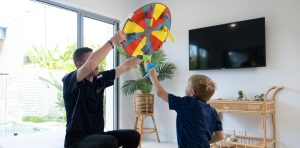How Play Therapy in Paediatric Physiotherapy Encourages Movement and Growth
When it comes to children’s physical development, movement is a powerful tool, especially when it’s integrated into play. Paediatric physiotherapy leverages play therapy techniques to support physical, social, and emotional growth in a holistic way that resonates with children. Through therapeutic play, children learn essential motor skills, build physical strength, and gain confidence in a setting that feels natural and enjoyable.
The Role of Play in Paediatric Physiotherapy

Play therapy is a specialised approach in paediatric physiotherapy that uses structured play activities to address various physical and developmental needs. Rather than a conventional treatment setting, play therapy creates a positive and engaging environment where children feel motivated to participate. This unique therapeutic approach can be used to improve mobility, address coordination challenges, and enhance fine and gross motor skills.
Through play therapy, children experience targeted exercises within a supportive and playful framework. This method is particularly effective because it taps into children’s natural desire to explore, create, and move, which fosters both physical and emotional engagement.
Encouraging Movement through Play Therapy
Movement is central to a child’s overall development, impacting their motor skills, body control, and balance. In paediatric physiotherapy, play therapy incorporates various activities aimed at developing these skills in a way that feels fun and rewarding:
1. Enhancing Motor Skills
Play therapy activities often involve tasks that require the child to practice fine and gross motor skills. For instance, games that include stacking, jumping, or catching help develop coordination, which is essential for many day-to-day tasks and sports. These play-centered activities are designed to encourage repetition, allowing children to practice movements in a relaxed setting.
2. Improving Physical Strength and Endurance
Activities such as obstacle courses, climbing, or pushing objects build muscle strength and endurance. Children may not even realise that they are working on strength-building exercises as they play, which makes them more likely to stay engaged and motivated. This approach helps build resilience and prepares children for physically demanding tasks.
3. Developing Body Awareness and Control
Through play therapy, children gain a better sense of how their bodies move and function. By navigating activities that require spatial awareness, balance, and hand-eye coordination, they develop body control and learn to move with confidence. These skills are foundational, impacting everything from how they walk to how they participate in sports or interact with others on the playground.
Fostering Emotional and Social Growth

Beyond physical development, play therapy offers essential benefits for a child’s emotional and social growth:
1. Building Emotional Resilience
Engaging in therapeutic play allows children to face challenges in a safe environment. When children play, they experience small successes and setbacks, which teaches them resilience. This type of therapeutic play helps them understand that practice and perseverance lead to improvement.
2. Developing Social Skills
Many play therapy exercises are designed for group settings, which provide valuable opportunities for children to practice social skills. Activities that require turn-taking, cooperation, or sharing help children learn how to communicate and interact positively with peers. These skills contribute to their social confidence, which is crucial as they navigate social situations in school and beyond.
3. Encouraging Independence and Problem-Solving
In play therapy, children often make their own decisions about how to complete a task or solve a challenge. This promotes independence and problem-solving, as children learn to explore solutions and make choices in a controlled environment. For instance, they might figure out how to maneuver through a play-based obstacle course or stack blocks in a specific pattern. Such experiences encourage children to think creatively and build confidence in their abilities.
Examples of Play Therapy Activities in Paediatric Physiotherapy
Although the structure of play therapy sessions can vary based on each child’s unique needs, here are a few general activities commonly used:
- Obstacle Courses: These courses can involve crawling, jumping, or balancing, helping children work on coordination and core strength.
- Creative Movement Games: These activities encourage children to explore different ways of moving, like hopping, marching, or mimicking animals, which boosts flexibility and movement control.
- Sensory Activities: Using textured items or engaging in sand or water play can help children develop fine motor skills and sensory awareness, important for tasks like handwriting and dressing.
The Role of Parents and Caregivers in Play Therapy
Parental support is invaluable in reinforcing the benefits of play therapy. By understanding and participating in therapy activities, caregivers can help extend the benefits into the home. Simple routines, like encouraging playtime with activities that support balance or coordination, can complement therapy goals. For example, introducing playful balancing games or encouraging safe jumping exercises can enhance a child’s physical development.
Choosing the Right Paediatric Physiotherapy Team
For parents considering paediatric physiotherapy, selecting a team experienced in play therapy is key. Play therapy is most effective when guided by professionals who understand how to tailor activities to each child’s physical, emotional, and developmental stage. A skilled paediatric physiotherapy team can ensure a safe, engaging environment where each child can progress toward their goals.
Empowering Children through Play Therapy
Play therapy offers a powerful approach to paediatric physiotherapy, promoting both movement and growth in ways that feel natural and enjoyable. From motor skills to social confidence, the benefits extend beyond the therapy room, helping children develop the foundation for a healthy, active life.
If you’re interested in learning how play therapy can benefit your child, Team Rehab Solutions offers specialised paediatric physiotherapy services designed to nurture each child’s unique potential. Reach out through our contact form or call 1300 685 046 to discuss your child’s needs with our expert team.
